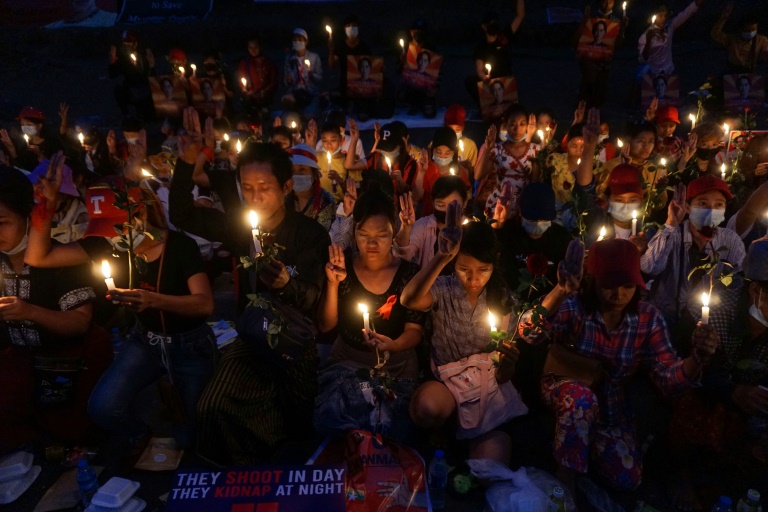
YANGON, Feb 22 (NNN-AGENCIES) — The Myanmar junta warned anti-coup protesters they could die but thousands of people took to the streets again on Monday, with tensions soaring over the deaths of four demonstrators.
Much of Myanmar has been in uproar over the generals ousting and detaining civilian leader Aung San Suu Kyi three weeks ago.
Massive street demonstrations have taken place across the country, while a civil disobedience campaign has choked many government operations as well as businesses.
“Protesters are now inciting the people, especially emotional teenagers and youths, to a confrontation path where they will suffer the loss of life,” said a statement on state-run broadcaster MRTV.
The statement, read out in Burmese with text of the English version on the screen, cautioned protesters against inciting “riot and anarchy.”
The warning followed the deadliest weekend since the coup – two people were killed when security forces fired at protesters in the city of Mandalay, and a third man was shot dead in Yangon.
A young woman also died on Friday after being shot in the head at a protest and spending almost a fortnight on life support.
They, woman whose funeral was held on Sunday, was the first confirmed fatality of the protests, and she has emerged as a potent symbol of the anti-junta movement.
United Nations special rapporteur Tom Andrews said he was deeply concerned by the junta’s new threat.
“Warning to the junta: Unlike 1988, actions by security forces are being recorded & you will be held accountable,” he tweeted.
But protesters appeared undeterred Monday, with thousands gathering in two neighbourhoods of Yangon, Myanmar’s biggest city and commercial hub.
“We came out today to join in the protest, to fight until we win,” said Kyaw Kyaw, a 23-year-old university student.
“We are worried about the crackdown, but we will move forward. We are so angry.”
In the Bahan township area, demonstrators sat on a stretch of road and created a sea of yellow and red banners in support of Suu Kyi.
Yangon residents woke up to a heavy security presence, including police and military trucks on the roads and an embassy district barricaded.
Markets and shops were expected to remain closed in solidarity with the protesters.
There were also demonstrations in the cities of Myitkyina and Dawei.
Protesters also took to streets of Naypidaw, the capital, on motorbikes.
Myanmar’s generals have responded to the uprising by ramping up gradually ratcheting up the use of force, and the number of political prisoners.
Troops and police have used rubber bullets, tear gas, water cannon and even live rounds on occasion.
Authorities have detained 640 people since the coup, according to the monitoring group Assistance Association for Political Prisoners.
Those targeted include railway workers, civil servants and bank staff who have walked off their jobs as part of the anti-coup campaign.
The junta has also severely curbed internet access overnight for eight straight days, according to the monitoring group NetBlocks.
Myanmar’s foreign ministry on Sunday justified its use of force against protesters, and accused the United Nations and other governments of “flagrant interference” in the country’s internal affairs.
“Despite facing the unlawful demonstrations, incitements of unrest and violence, the authorities concerned are exercising utmost restraint through minimum use of force to address the disturbances,” it said in a statement.
The United States, Canada and Britain have imposed sanctions on the generals running Myanmar.
The United States warned again on Sunday of increased pressure.
“The United States will continue to take firm action against those who perpetrate violence against the people of Burma as they demand the restoration of their democratically elected government,” US Secretary of State Anthony Blinken tweeted Sunday.
European Union foreign ministers are expected to meet Monday to approve their own sanctions against Myanmar’s generals. — NNN-AGENCIES






